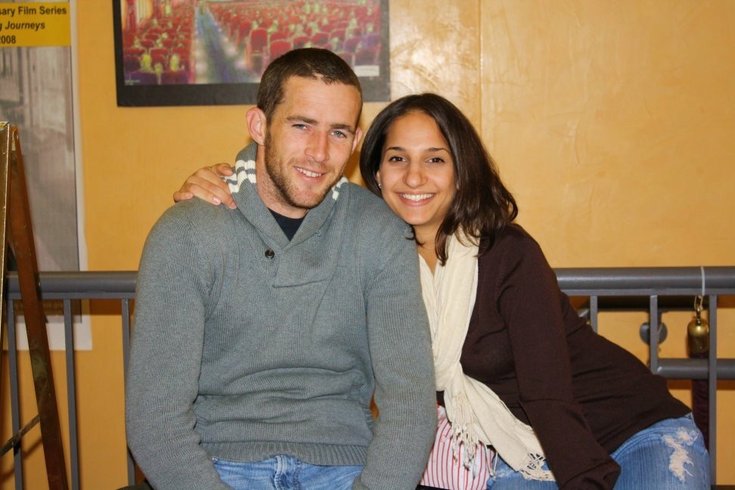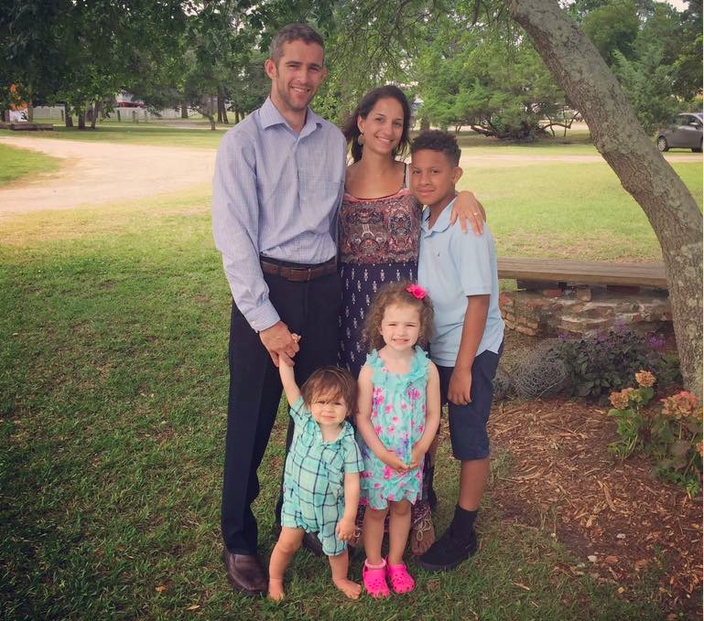
July 24, 2019
 Courtesy/Keran Byrne
Courtesy/Keran Byrne
Keith and Keran Byrne would get married about a year after their first date. They hit it off instantly, Keran recalled as her husband awaits possible deportation.
Editor's note: About 12 hours after this story was published by PhillyVoice, a federal judge ordered Keith Byrne's release from ICE detention. The Springfield, Montgomery County man returned home on Thursday afternoon.
Keith Byrne has now been released from detention. His family just sent me this photo of him and his wife, Keren on the way home 👇 pic.twitter.com/aTEZGmt6jR
— Jackie Fox (@jackiefox_) July 25, 2019
• • •
Two weeks ago today, Keran Byrne was scrambling to get her three children ready for an overnight trip to a waterpark resort in the Poconos. Around 8 a.m., the doorbell rang at her family’s new home in Springfield Township, Montgomery County.
With so much going on inside – mornings are never easy when you have three kids ranging in age from 4 to 13 – Keran tried to ignore it, figuring it was just a package delivery.
When the follow-up knocks grew louder and louder, the mother stopped what she was doing and went to check who was there.
Her husband Keith – a 37-year-old who moved here from Fermoy, County Cork, Ireland in 2007 – had already left the house to begin his workday at the painting company he’d started several years earlier.
That Wednesday was just another day in more than a decade of toiling to give his family a better life, including a move last December from Philadelphia to the cozy, fixer-upper home he and his wife bought on a tree-lined block just off Paper Mill Road near Route 309.
Summer is the busiest time of year for O’Broin Painting – Keith was juggling two projects, with others awaiting his attention – so he’d generally be out the door before the rest of the family were fully out of bed.
When Keran opened the door, she saw a 30-something man dressed as if he could be a salesman, not one who carries a gun and a badge. In his hands, Keran quickly noticed, were her husband's car keys and mobile phone.
“I immediately thought the worst,” a sullen Keran said Tuesday, as she sat at a dining room table with a map of Ireland framed on the wall behind her, recounting how her family life has been turned upside down.
Though the message didn’t involve roadway injury or death, Keran’s worst-case suspicions weren’t far from the truth.
“He said, ‘I’m with ICE (U.S. Immigration and Customs Enforcement). We just picked up your husband. We have him. His car is at this address. Here’s his keys and phone. He’s being detained. Don’t come down to the station. There’s nothing you can do there,’” she recalled. “He told me that four times, very matter of fact, but somewhat sympathetic. I was inconsolable, immediately.”
Keran and Keith Byrne, and their family.
It visibly pained her to relive those moments, but she realizes that the only way Keith might walk through that door again is bringing attention to the nightmare threatening to destroy their family.
As she shared her story, Keith Byrne remained in custody at Pike County Correctional Facility some two-and-a-half hours north of their suburban home.
Despite a decade of working within the system to become an American, he could be deported to Ireland at a moment’s notice, all because of how a broken immigration system responded to a minor marijuana infraction from before Keith ever set foot in the United States and started building his American dream.
In the two weeks since a car followed Keith off his block and activated a light on its dashboard, the Byrne family's story has become a front-page controversy in Ireland. In recent days, a FaceTime interview with Keran led the national nightly news in recent days.
The case has prompted nearly 3,600 friends and supporters to sign an online petition to halt Keith’s deportation, and a fundraising effort that’s raised some $31,000 to support the Byrne family.
Granted, Keith Byrne is not blameless in this situation, but it's unlikely to have become an issue before the recent hardening of immigration standards. He walked a noble path, only to end up with his family in a precarious position.
In 2007, Keith was a 25-year-old who wanted to visit cousins already living in America. He did so thanks to a visa waiver program that enables visitors to stay for 90 days if they agree to sign away rights to contest deportation should they overstay their welcome.
Keran and Keith Byrne thought they were living the American dream when they moved from Roxborough to a new home in Springfield Township, Montgomery County in December 2018. They now find themselves wondering whether Keith's immigration status will tear the family apart.
Keith would meet Keran a month later, but they didn’t really talk at a gathering of mutual friends. About a year later, their paths crossed again.
“We were at a friend’s house for dinner and we just connected, talking the entire night,” recalled Keran, who's on leave for a month from her job as a nurse at Jefferson Methodist Hospital in South Philadelphia.
Keith called her a few days later, and asked her out. He lived in Roxborough, she lived in Germantown and they settled on Le Bus in Manayunk for a meeting that turned into “a 12-hour date,” including lunch, dinner, ice cream, conversation and learning how to play chess.
Over the course of the next year, they fell deeply in love.
"I was in nursing school with a toddler when he came into my life," Keran said. "He supported us in any way we needed, and worked really, really hard to do so. He was not allowed to drive yet, so he rode a bike for miles, in rain or snow, all so he could work and get paid, so we could eat."
On October 10, 2009, they got married in a tiny ceremony at a gazebo behind the Philadelphia Museum of Art, followed by a “reception” at Keran’s mother’s house.
“We had no money. I had a two-year-old (from a previous relationship) literally in my arms at the ceremony,” she said. “We just wanted to be married.”
Keith Byrne and children welcome a newborn to their family.
After getting married, the Byrnes applied to get Keith’s residency status “adjusted.”
That’s how they came to learn that two minor marijuana-related charges from a couple years before he came to the United States could come back to haunt him.
“It was not a big deal at the time. He did no jail time. There was no court appearance. He had no lawyer,” Keran said. “He had a fine, went and paid it. He did whatever he was supposed to do.”
Accepting the visa waiver program was another thing that would come back into the mix more than a decade later.
“He signed his life away with a stupid piece of paper that he probably didn’t even read,” she said. "Who reads everything when they're 25? He was just excited knowing that he could come to America.
“When he came here, he only intended to stay for three months. Coming here to stay was not the intention. But, life happened and he wasn’t ready to leave.”
Then, she audibly sighed. Life's been happening in a way they're not too happy about lately.
Three months away from her 10th wedding anniversary to the man of her dreams, Keran looks back at all the efforts the couple made to rectify Keith’s permanent residency issue.
Some ignorant strangers who’ve heard their story have reverted to the “come here the right way” trope, she has tried to brush it off. After all, that’s exactly what they were committed to doing.
At the dining room table, I showed Keran how ICE officials answered when asked for comment on the case. It read, in its entirety, as follows:
In 2007, Keith Byrne, 37, a citizen of Ireland, entered the United States as a nonimmigrant under the Visa Waiver Program and failed to depart the United States under the terms of his admission.
ICE arrested him July 10 for immigration violations and issued him a visa waiver removal order. He is currently in ICE custody pending removal.
A Visa Waiver is good for 90 days. Attributable to ICE Officials. Thank you.
Her response: “They left out a lot."
For nine years, he lived and worked legally in Philadelphia and Montgomery County. He got a driver’s license, Social Security number and worked “on the books” for another painting company before taking the entrepreneurial leap.
All the while, the Byrnes – represented by former immigration attorney and current state Rep. Joe Hohenstein – played the waiting game.
“During that permanent residency, you’re legally allowed to be here, but when that time is up, you have to reapply for that, or for citizenship, when they ask ‘Has this person been living an honest life? Do we want to keep him?’ Keith had to reapply a few times along the way," Keran shared.
“He was given all the tools by immigration to grow roots here, and then they literally pluck him off the street with no warning." – Keran Byrne
“If you’re in the process of appealing, you’re allowed to be here," she continued. "They can’t deport you. Living was a little precarious, wondering what the decisions were going to be. Every day that Keith would come home, the first thing he’d do is look in the mail.”
The most recent appeal came in October 2017 after the adjustment of status was denied. Keith’s attorney filed a motion to reopen the case because they felt as if they’d been “unjustly denied, that the case wasn’t reviewed thoroughly.”
That status – which resembled citizenship purgatory – evaporated in February, when he checked the mail and saw that they’d lost an appeal of a refusal to grant him residency because of the marijuana charges.
It was a jarring development for a growing family just four months after buying the home of its dreams.
In March, the family was still in the process of unpacking at their new home. It was a hectic time.
Keith and Keran somehow spaced out on the need to file a new appeal, which would have granted Keith a level of security as it played out within the system.
“We were extremely distracted. I don’t want that to sound like we’re making up some excuse, but we were,” Keran said.
It gnaws at her that had Keith not fessed to those earlier legal entanglements, immigration officials never could have tracked it down. Heck, it took them substantial lifting just to get the details, with the infractions so minor they didn’t appear in criminal-history searches, she said.
“If we never said anything, he’d be a citizen right now,” she said. “But we were going to do things the right way, not that we didn’t know what the risks were, but these things are so minor, how could they possibly be an issue?”
That they didn’t file an appeal this spring ended up being the tipping point.
When Keith asked the ICE agents two weeks ago why they picked him up while he was driving to work, he was told his case was sent their way because of “inactivity in his file.”
“It was literally a few months, but his case got handed over to ICE,” Keran said. “It was never our plan for him to live here illegally. We never wanted him here living in the shadows.”
Moving the family to Ireland was always an option if the appeals were exhausted, albeit a worst-case one.
Since Keran’s son from a previous relationship is close with his biological father, and their two children “don't deserve to be without their dad,” the ideal outcome is somehow convincing immigration authorities to let Keith stay here.
“He was given all the tools by immigration to grow roots here, and then they literally pluck him off the street with no warning,” she said. “We didn’t even know it was heading that way. His address is on file. There’s no confusion about where he might be.
"With the sweeps, they said they were targeting the undocumented, criminals, those here illegally. He doesn’t fit any of those criteria.”
The work vehicle that Keith Byrne was driving when stopped by ICE agents earlier this month sits outside the family's dream home in Springfield Township, Montgomery County.
But none of that kept ICE agents from taking her husband into custody.
The children were home when the federal agent broke the horrible news to Keran, but a family friend took them on the trip to the water-park resort anyway so their mother could figure out what the heck was going on.
“I’m still not OK. You would have thought that he died, the way I’m grieving and mourning his loss, thinking I’m never going to see him again because I knew how serious the situation is,” she said. “This is the longest we’ve been apart since that first date.”
So what can the Byrne family do to stay together in their new home, in the land they love?
Keran has launched an awareness mission, granting media interviews and reaching out to as many elected officials as she can, not to mention the Irish ambassador in Washington, D.C., and the Irish Consulate in New York City.
A case has been made to Acting ICE Director Matthew Albence, pleading that the agency “use their discretion in the case, and think about all the devastation that will occur to our family and Keith if we are separated,” Keran said.
U.S. Rep. Brendan Boyle personally called Keran when he heard of her plight. He explained his interest in a statement to PhillyVoice this week.
The Keith Byrne case is one of many examples that show just how broken our immigration system is. Mr. Byrne is married to an American wife and has three American children.
He started his own small business and pays taxes. He’s never had so much as a speeding ticket while living in the U.S. How exactly does it make America great to deport this man?
For over a decade now, polls have consistently showed about 70 percent of the American people favor comprehensive immigration reform. In 2013, the Senate passed such a bill by a 68-32 vote.
But a small, very loud, nativist minority has been able to block it. Immigrants built America. To betray them, is to betray our country’s history.”
Meanwhile, the Byrnes' new attorney, Tom Griffin, said Tuesday afternoon that he was in the process of filing a petition for writ of habeas corpus in the U.S. District Court for the Middle District of Pennsylvania. This, because Griffin knows that Keith “could be deported any minute.”
He explained that Keith “ran into a wall with legal applications to get a green card, and exhausted all the lawful procedures because the government keeps saying that you can’t get one because of what you did in Ireland.”
To Griffin, the government’s approach to immigration in post-9/11 America shifted the view of immigrants to being a security issue where “everyone’s suspected of being a terrorist.”
“He was never facing removal like the average non-citizen. He always had an ‘affirmative position.’ He came here and fell in love,” Griffin said. “They spent nine years trying and he didn’t even have two marijuana offenses. (Former attorney) Joe (Hohenstein) proved it was only one, and that it wasn’t even considered a crime in Ireland.
“He’s being held up as an example that all communities can face this.” – Tom Griffin, the Byrne's new immigration attorney
“When the legal avenues ended in (spring), in the pre-Trump era, USCIS (U.S. Citizenship and Immigration Services) would deny it and throw it in the archives, saying ‘we’re not going to do anything to you. Try to make it in the U.S. without documents. Since (President Donald) Trump (was elected), USCIS has been commanded to give that info to ICE: ‘We got another one for you.’”
The petition being filed by Griffin on Keith’s behalf will attempt to make a case under the federal Administrative Procedure Act, arguing that the government did not approach Keith’s most recent appeal properly, thus giving him the right to sue the agency.
Winning that won’t ensure he gets to stay in the country, only that the appeal gets looked at anew. That’s the best they can hope for at this point, at a time when immigration issues are at their most controversial in America.
“He’s being held up as an example that all communities can face this,” Griffin said, making the case that it extends beyond what’s happening at the southern border.
Last week, Keran took the children to see Keith in custody, at a prison shared by people facing immigration issues and those convicted of serious crimes.
That they had to go through metal detectors and get wanded was bad. That it was a no-contact visit through a thick sheet of glass was even worse.
“It was the worst experience ever for the kids, and extremely emotional for Keith, too,” Keran said. “It was something they never should have to go through. He said he hasn’t had any issues with safety, but it scares the s*** out of me.”
She’s buoyed by the outpouring of support shown to her family, from the boss that gave her a month off “until I can get my feet back under me” to the circle of close girlfriends “who are helping take care of all the mommy things.”
“You can see how easy it is for ICE to rip a family apart. People need to be aware of how simple it is for them to destroy families...." – Keran Byrne
“I’m a wreck,” Keran admitted. “I can’t seem to get anything done except work to get him back.”
That the legal case remains up in the air does not help in the least, but she doesn’t want to call the fight off until it’s over.
She rues the trend toward America’s more aggressive approach to immigration enforcement.
“You can see how easy it is for ICE to rip a family apart. People need to be aware of how simple it is for them to destroy families like this,” she said. “He’s worked so f***** hard just to live here in Springfield. We built this life out of pure hard work and labor. I’m so upset that he’s not here to enjoy it, that he’s in a f****** cage.”
Then, she thought about the fact that today will mark the two-week point in the family’s nightmare.
“We’ve been talking every night, but this time away, it’s 14 days and we’d never been apart for more than three days since we met,” she said. “It’s torture for both us. We’ve never been apart like this before.”
Follow Brian & PhillyVoice on Twitter: @brianphickey | @thePhillyVoice
Like us on Facebook: PhillyVoice
Add Brian's RSS feed to your feed reader
Have a news tip? Let us know.
 Courtesy /Keran Byrne
Courtesy /Keran Byrne Courtesy/Keran Byrne
Courtesy/Keran Byrne Courtesy /Keran Byrne
Courtesy /Keran Byrne Brian Hickey/PhillyVoice
Brian Hickey/PhillyVoice